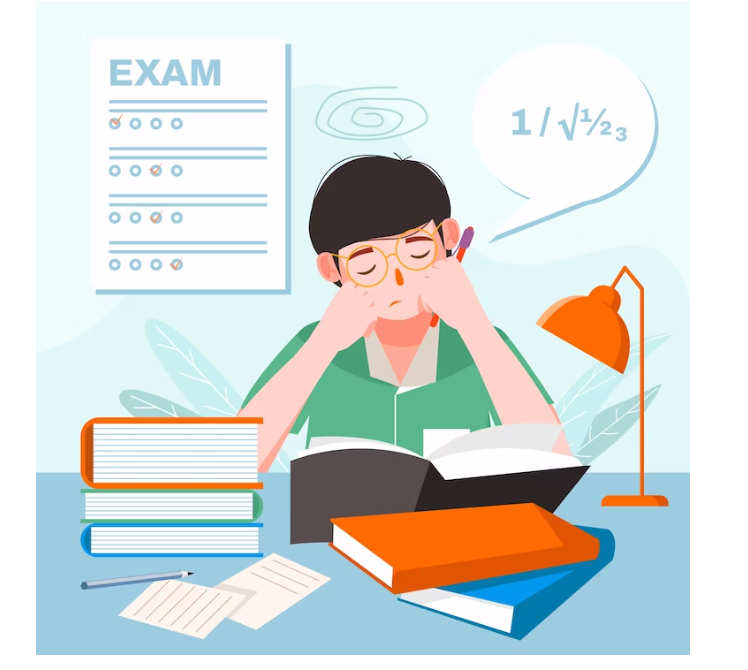10 Proven Strategies for Overcoming Exam Anxiety

Discover 10 Proven Strategies to Conquer Exam Anxiety and Succeed
Exam anxiety is a common challenge experienced by students across various educational levels and even professionals preparing for certification exams. While a certain level of anxiety can be motivating, excessive anxiety can hinder one’s performance, leading to suboptimal results. In this comprehensive guide, we will delve into a detailed exploration of effective strategies to conquer exam anxiety.


These 10 Proven Strategies are meant to help students manage anxiety from preparation through test day and beyond. This blog gives readers practical ways to minimise stress and boost performance to maximise achievement.
1) Identify Your Triggers
The first step in effectively addressing exam anxiety is to identify its root causes. This trigger varies greatly by person. Different people have different triggers. They may include test phobia, time pressure, self-doubt, or traumatic prior experiences. They may include the fear of failure, the pressure of time constraints, a lack of self-confidence, or even traumatic past experiences related to exams. By pinpointing the specific triggers that affect you, you gain valuable insights into the origins of your anxiety. This knowledge serves as the foundation upon which you can construct targeted strategies to mitigate its impact.
For instance, imagine a student who constantly worries about failing exams due to a past instance of poor performance. Identifying this trigger allows them to work on building self-confidence and reframing their perception of exams.

2) Develop a Positive Mindset
Next from 10 Proven Strategies for Overcoming Exam Anxiety is cultivating a positive mindset is a potent weapon against exam anxiety. Instead of obsessing over the possibility of failure or setbacks, redirect your mental focus towards your strengths and your dedicated preparation efforts. Recognise your hard effort and long hours in school to boost your exam confidence. Positive self-talk boosts confidence and reduces anxiety
Consider a scenario in which a student catches themselves thinking, “I might forget everything during the exam.” By adopting a positive mindset, they can counter this negative thought with, “I have prepared thoroughly, and I can handle any question that comes my way.”
3) Create a Study Plan
A well-structured study plan forms the cornerstone of effective exam preparation and beats exam anxiety. Divide your study materials into manageable sections and establish realistic objectives for each study session. Ensure that you allocate adequate time for revisions and practice exams. By meticulously organizing your study routine, you gain a sense of mastery over the subject matter, effectively reducing feelings of overwhelm.


Imagine a student facing a comprehensive history exam. Breaking down their study sessions by historical eras and allocating specific time slots for review sessions and practice tests can help them maintain control over their preparation.
4) Prioritize Sleep and Nutrition
The significance of sleep and nutrition in managing exam anxiety cannot be overstated. Aim for 7-8 hours of undisturbed sleep each night, especially before the test. Eat a balanced diet of fruits, vegetables, protein, and whole grains and limit coffee and sweets. Balanced eating reduces anxiety and energy crashes.
Imagine a student who sleeps well and eats well the night before a big test. They feel more alert, focused, and calm. They are more likely to feel alert, focused, and less anxious.

5) Arrive Early and Relax
On the day of the exam, arriving at the test centre well in advance offers several advantages. It allows you to familiarize yourself with the examination environment, reducing the element of surprise. Additionally, taking a few moments to calm your nerves before the exam can significantly enhance your performance. Engaging in deep breathing exercises can help reduce physiological stress responses, fostering a sense of calm. During the examination, reading instructions thoroughly and adopting a methodical approach to answering questions—one at a time—can help maintain composure. If confronted with a particularly challenging question, it’s advisable to move forward and return to it later.

Envision a student who arrives at the exam centre 45 minutes early, allowing them ample time to adapt to the surroundings and engage in relaxation exercises. When they encounter a daunting question during the test, they take a deep breath and continue with the others before revisiting it.
6) Seek Support
Recognizing the need for support in managing exam anxiety is crucial. Never hesitate to reach out to trusted individuals such as teachers, mentors, counsellors, or family members. They can offer valuable guidance, coping strategies, and a sympathetic ear. Sharing your concerns and seeking advice can alleviate feelings of isolation and stress, making the journey towards overcoming anxiety more manageable.
Suppose a student experiences overwhelming anxiety before an important physics exam. They decide to confide in their supportive physics teacher, who offers encouragement, study techniques, and reassurance, ultimately boosting the student’s confidence.
7) Study in a Familiar Environment
Choosing to study in an environment that mirrors the conditions of the exam location can significantly enhance comfort and confidence. This approach reduces the unfamiliarity of the test centre and improves concentration during the examination.
Picture a student who frequently practices in a quiet library or a room devoid of distractions, closely resembling the examination setting. This method helps them adapt more seamlessly to the actual test environment.
8) Practice Relaxation Techniques
When implemented into regular practice, several relaxation methods have the potential to successfully lower levels of nervousness, particularly when dealing with exam anxiety. Exercises in deep breathing, gradual muscular relaxation, and mindfulness meditation are some examples of these practices.
Consider a student who dedicates a few minutes each day to deep breathing exercises. By the time the exam arrives, they have honed their ability to remain calm and focused under pressure.
9) Visualize Success
Visualization is a potent tool for mentally preparing yourself for the exam experience. Create a vivid mental image of yourself performing exceptionally well in the examination—answering questions with confidence and achieving the desired outcome. This mental rehearsal can significantly boost self-assurance and minimize anxiety. As you continue to visualize success, you will find yourself increasingly believing in your capacity to replicate these achievements in real-life situations.

Visualize a student who envisions themselves acing the exam, calmly tackling each question with precision. This visualization bolsters their confidence, allowing them to face the actual exam with a heightened sense of self-assuredness and reduces exam anxiety.
10) Maintain a Balanced Perspective
last of 10 Proven Strategies for Overcoming Exam Anxiety is to maintain a balanced perspective regarding exams and their outcomes. While striving for excellence is commendable, it is equally vital to acknowledge that setbacks are a natural part of the learning journey. Even the most accomplished individuals encounter failures and challenges throughout their educational or professional endeavours. In the event of an exam-related setback, remind yourself that examinations are but one facet of your educational or career trajectory. Consider the following aspects:
Learning Opportunity: View failures or less-than-ideal outcomes as opportunities for growth and learning. Analyze what went wrong and employ the experience to make improvements in your study techniques and exam strategies.
Resilience: Embrace the resilience that arises from overcoming challenges. Confronting adversity and persisting through setbacks can build character and fortify your ability to face future obstacles with determination.
Alternative Paths: Recognize that there are often multiple routes to success. If a particular exam does not yield the desired results, explore alternative avenues for achieving your objectives. This may involve reattempting the exam, seeking additional training, or exploring different career prospects.
Life Beyond Exams: Keep in mind that examinations do not define your entire existence. Your worth and potential extend far beyond the outcomes of a single test. Accept that success is a multidimensional path and focus on what you can control—your preparation, effort, and well-being.
Conclusion
Exam anxiety may be overcome with practice and a comprehensive approach to well-being. By implementing these 10 Proven Strategies outlined above and seeking support when necessary, individuals can effectively manage anxiety and excel in their exams. It is essential to remember that success is attainable, and examinations represent just one facet of your educational or professional voyage. Approach exams with confidence, resilience, and a growth-oriented mindset, recognizing that every experience contributes to your personal and academic growth.







